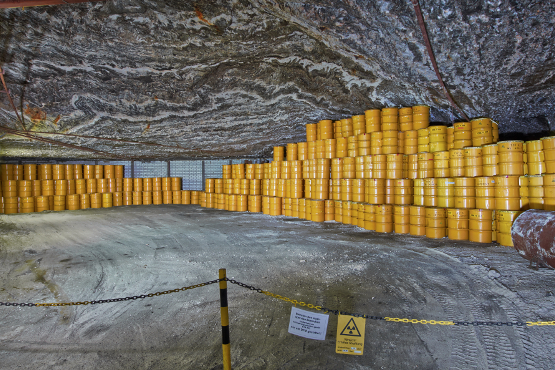Germany aims to phase out its nine remaining reactors by 2022, faster than almost any country. But nobody knows exactly how much it costs to shut and clean up atomic-power plants and all the facilities used over decades to store radioactive waste. Building a depository for the waste deep underground and delivering the waste add additional unknown costs…
“There are still no clear answers to many fundamental questions involving final and intermediate storage, dismantling [reactors] and transporting radioactive waste,” said Frank Mastiaux, chief executive of EnBW Energie Baden-Württemberg AG, one of Germany’s largest utility companies. “Concrete concepts have long been promised, but there is nothing yet in sight.”
Nuclear energy accounts for about 16% of German electricity production, down from a peak of 31% in 1997, according to the federal statistics office. France gets roughly 75% of its electricity from nuclear energy and the U.S. around 20%, according to the World Nuclear Association. The issue of Germany’s decommissioning became urgent in 2011, after the disaster at Japan’s Fukushima power plant, when Ms. Merkel decided to accelerate the shutdown of all German reactors by as much as 14 years, to 2022.
That move forced EnBW and Germany’s other big utilities—E.ON SE, RWE AG and a unit of Sweden’s Vattenfall AB—to book billions of euros in write-downs on nuclear assets and increase their provisions for early decommissioning of the facilities. The provisions now total about €37 billion ($40 billion).
The cost could ultimately top €50 billion, estimates Gerald Kirchner, a nuclear expert previously at Germany’s federal office for radiation protection.And that money might have to be covered by taxpayers if a power company faces insolvency or some other scenarios, the government report warned.
The energy companies are being pummeled by falling electricity demand in Europe and billions of euros in government-subsidized so-called green energy flooding the power grid. Both effects are eroding wholesale power prices, leaving conventional power stations unprofitable…
Germany isn’t alone in tackling decommissioning. The International Energy Agency says roughly half of the world’s 434 nuclear-power plants will be retired by 2040. Most are in Europe, the U.S., Russia and Japan.Despite this global trend, no country yet has a site ready for final disposal of radioactive waste.
Germany is trying to find a deep geological site suitable to store highly radioactive waste for about one million years—the time waste needs to become safe to most living organisms. The country expects about 600,000 cubic meters of radioactive waste by 2080. And that doesn’t include more highly radioactive waste slated to be shipped back soon from France and Britain, where German nuclear fuel had been sent for reprocessing…
Until a final disposal site is found, all waste will be stored temporarily. Keeping interim facilities safe is expensive. E.ON has said delays in finding a disposal site will cost the German nuclear industry €2.6 billion.Utilities have sued the German government to recover some cleanup costs, but verdicts could be years away. And their efforts face political opposition.
Excerpts By NATALIA DROZDIAK and JENNY BUSCHE, Germany’s Nuclear Costs Trigger Fears, Wall Street Journal, Mar. 22, 2015



